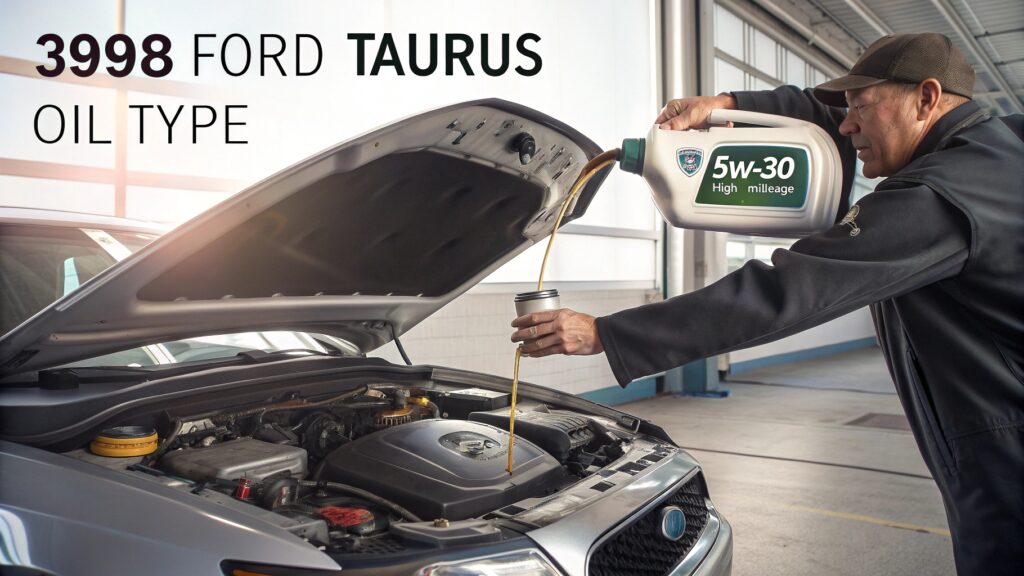The 1998 Ford Taurus uses 5W-30 motor oil, with a capacity of 5 quarts for the Vulcan engine and 6 quarts for the Duratec. Always check your engine type before refilling. Use high-mileage or synthetic oil for better performance and longevity.
Stick around — we’re about to break down everything you need to know in our “1998 Ford Taurus Oil Type and Capacity Guide.”
What Is the Recommended Oil Type for the 1998 Ford Taurus?
If you own a 1998 Ford Taurus, using the right engine oil type is one of the most important steps you can take to extend your car’s life. For most 1998 Taurus models, 5W-30 motor oil is the recommended oil type regardless of whether your car is powered by the 3.0L Vulcan engine or the DOHC Duratec variant.
Using the manufacturer-recommended oil improves performance, ensures smoother starts, and reduces wear and tear — all critical for older vehicles like the ’98 Taurus.
| Engine Type | Recommended Oil Type |
| 3.0L V6 Vulcan OHV Engine | 5W-30 (Conventional or Synthetic Blend) |
| 3.0L V6 DOHC Duratec Engine | 5W-30 (Full Synthetic Preferred) |
Why Is 5W-30 the Best Oil for a 1998 Ford Taurus?

The 5W-30 viscosity rating makes it ideal for all-season use in the 1998 Ford Taurus. The “5W” indicates how the oil flows at cold temperatures, while the “30” reflects how it performs when the engine is hot. This balance is crucial for protecting older engines.
Key Benefits of 5W-30 Oil:
- Cold Start Protection: Flows quickly in winter, reducing engine wear.
- Heat Stability: Maintains thickness and protects during summer driving.
- Cleaner Engine: Helps reduce sludge in aging engines.
- Compatible with High Mileage Formulas: Great for vehicles over 100k miles.
This is why 5W-30 is the best oil for the 1998 Ford Taurus, especially when combined with a high mileage oil designed to condition seals and reduce oil burn-off.
How Much Oil Does a 1998 Ford Taurus Need?
Knowing your vehicle’s oil capacity ensures a proper oil change. The 1998 Ford Taurus oil capacity depends on the engine variant.
| Engine Type | Oil Capacity (with filter) |
| 3.0L Vulcan OHV | 5 quarts |
| 3.0L DOHC Duratec | 6 quarts |
Oil Filter Tip:
Using the correct oil filter also matters. The 1998 Ford Taurus oil filter size can vary slightly by brand, but common fits include:
- Motorcraft FL-400S
- Fram PH3600
- WIX 51372
Always pair your oil change with a new oil filter to ensure maximum protection and flow.
What Happens If I Use the Wrong Oil in My 1998 Taurus?
Using the wrong oil type or viscosity can lead to:
- Increased engine wear due to poor lubrication
- Higher oil consumption and leaks
- Poor fuel efficiency
- Harder starts in cold weather
- Possible check engine light activation
Even small variations in viscosity or oil quality can affect performance, especially in older engines like the 1998 Ford Taurus. That’s why sticking with the Ford Taurus oil specifications for 1998 is important for long-term reliability.
What Are the Best Oil Brands for a 1998 Ford Taurus?

You don’t just need the right type — you need a quality brand that offers performance and protection. Whether you prefer conventional, synthetic, or high mileage oil, here are some trusted picks:
Best Oils for the 1998 Ford Taurus:
| Brand | Type | Best For |
| Mobil 1 High Mileage 5W-30 | Full Synthetic | Engines over 100k miles |
| Valvoline MaxLife 5W-30 | Synthetic Blend | Long-lasting seal protection |
| Castrol GTX 5W-30 | Conventional | Budget-friendly & effective |
| Motorcraft 5W-30 | Synthetic Blend | OEM recommended by Ford |
These oils meet or exceed the recommended motor oil for the Ford Taurus 1998, and many offer advanced protection designed for older engines.
How Often Should I Change the Oil in My 1998 Ford Taurus?
For a 1998 Taurus, the oil change interval depends on the type of oil you use:
- Conventional Oil: Every 3,000 to 4,000 miles
- Synthetic Blend: Every 5,000 to 6,000 miles
- Full Synthetic: Up to 7,500 miles under ideal conditions
Suggested Maintenance Schedule:
| Oil Type | Interval |
| Conventional | 3,000–4,000 miles |
| Synthetic Blend | 5,000–6,000 miles |
| Full Synthetic | 6,000–7,500 miles |
Always check your oil level monthly, especially if you’re using a high mileage oil for a 1998 Ford Taurus — older engines can consume more oil over time.
What Tips Can Help Me Maintain My 1998 Ford Taurus Engine Better?

Proper oil changes are just the beginning. Here’s how you can keep your Taurus running reliably for years:
Smart Maintenance Tips:
- Warm the engine before draining old oil for better flow.
- Clean the oil fill area to avoid contamination.
- Use the correct torque on the drain plug (18–25 ft-lbs).
- Check for oil leaks after every oil change.
- Inspect your oil filter for quality and fit every time.
Also, if you’re wondering about synthetic vs conventional oil Ford Taurus 1998, synthetic usually offers better long-term protection, especially for engines with higher mileage or wear.
FAQ’s
What type of oil does a 1998 Ford Taurus use?
The 1998 Ford Taurus typically uses 5W-30 motor oil.
How many quarts of oil does a 1998 Ford Taurus take?
It takes 5 quarts for the Vulcan engine and 6 quarts for the Duratec engine.
Can I use synthetic oil in a 1998 Ford Taurus?
Yes, synthetic or high-mileage synthetic oil is safe and recommended for older engines.
How often should I change the oil in a 1998 Ford Taurus?
Change the oil every 3,000–5,000 miles, depending on oil type and driving conditions.
What happens if I use the wrong oil in my Taurus?
Using the wrong oil can lead to reduced engine performance and potential wear over time.
Conclusion
Choosing the correct oil type and capacity is essential for keeping your 1998 Ford Taurus running smoothly and efficiently. Whether you’re using the 3.0L Vulcan or Duratec engine, always stick with 5W-30 motor oil and follow the recommended capacity to avoid engine issues. Regular oil changes using high-quality brands will extend your engine’s life, improve fuel efficiency, and reduce long-term maintenance costs.
Stay tuned with us for more helpful car care guides to keep your Taurus in top condition.
